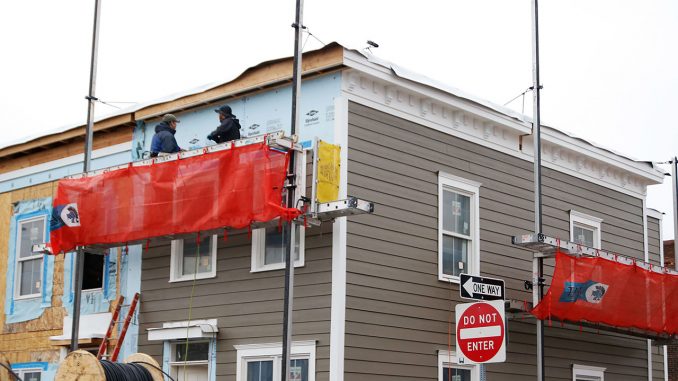
The Habitat for Humanity of Philadelphia, an independent nonprofit that builds affordable housing, will build nine homes along 16th Street near Norris by the end of the year, officials of the organization said.
Twelve homes were built along 16th Street near Norris last year as a part of the nonprofit’s Diamond Park affordable housing development plan, said Habitat for Humanity’s Director of Strategic Partnerships Carrie Rathmann. With four homes currently under construction, there will be 21 total homes when the project is complete.
The Diamond Park development is the organization’s largest project to date. The first phase, which was completed in June 2017, created 12 energy-efficient, three-bedroom homes with zero-interest mortgages for families that make 30 to 60 percent of the median area income.
The project near Temple was chosen, Rathmann said, to bring stability to an area with an influx of student housing. The Diamond Park project was created in part to combat the “rapid gentrification spurred by the expansion of Temple University,” according to the organization’s website.
“This area, for example, is somewhere that’s rapidly gentrifying, and people who are renting here won’t be able to afford to stay here,” said Rebekeh Packer, a 23-year-old AmeriCorps volunteer.
Habitat Philadelphia has increased its development in recent years, Rathmann added. Four years ago, it was building four to six houses a year, but now it is building 12 annually. In the future, the organization hopes to build up to 20 homes annually.
The organization has provided homes to more than 600 families since its Philadelphia chapter opened in 1985.
Habitat Philadelphia receives most of its funding from donations. The Philadelphia Housing Authority has also provided support for its projects through repairs to its homes, but Rathmann said it has not received “cash from the city in a long time.”
The funding mostly comes from donations from a variety of sources, like corporations, other nonprofits, philanthropic individuals and churches, Rathman said.
“We’ve raised the money to build these houses by the chunks of thousands,” Rathmann said. “So a company wants to come out, and they pay for a day of service. That doesn’t even fully cover the staff that has to get them productively working. It’s a hard process raising money to build houses.”
Still, the organization has increased its rate of housing projects with help from volunteers.
Construction Site Supervisor Kevin Crowley, 49, said there is always a demand for volunteer work and new affordable housing. Future homeowners are also expected to volunteer with the organization.
After qualifying for a housing unit by showing a need for high-quality housing, a good credit score and an ability to pay the mortgage, each prospective homeowner needs to complete the required 350 volunteer hours before they are eligible to move in.
These required hours, called “sweat equity,” usually take around 18 months to complete. The requirement can be fulfilled by working on one of the construction sites, participating in homeowner workshops and working in the South Philadelphia ReStore, which is a Habitat for Humanity discount home improvement store that sells donated furniture and construction materials to fund its projects.
Lorenzo Tekyane, 51, completed his volunteer hours in nine months. He said if a prospective homeowner finishes their first 225 hours before the others, they can get the first house that is completed.
Tekyane, his wife and two children have lived in their Habitat home in the Diamond Park development for eight months. Tekyane emigrated from Ethiopia in 2000 and was renting a home in West Philadelphia for 17 years, until rising prices and a difficult landlord led him to look for other options.
The goal of the organization, Rathmann said, is to work toward ensuring everyone has a decent place to live.
“If you care about crime and kids doing well in school and people having a chance at a decent job, they can’t be bouncing around worried about the affordability of where they are living and they can’t be moving every six to eight months at the whim of the market,” Rathmann said.



Be the first to comment